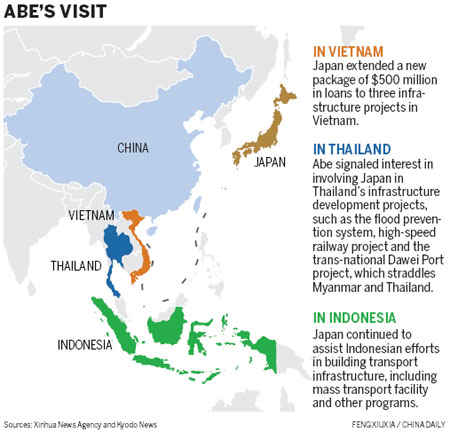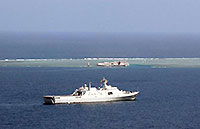Abe boosts ASEAN trade with visits
By Cheng Guangjin (China Daily) Updated: 2013-01-21 09:33But PM makes little progress in quest to diplomatically isolate China
Japanese Prime Minister Shinzo Abe's just-concluded maiden visit to three Southeast Asian countries last week saw enhanced trade ties with the region, but his bid to make ASEAN countries side with Japan against China got little support from his host countries, observers said.
During Abe's tour to Vietman, Thailand and Indonesia last week, his first overseas visit since assuming office in December, he focused on topics such as economic ties and protection of the seas.

At a news conference in Jakarta on Friday, Abe listed five principles of his ASEAN diplomacy, including an "open ocean, ruled not by power but by law ... and we and ASEAN will protect this with all our might", he said.
Commenting on Abe's policy toward ASEAN, Foreign Ministry Spokesman Qin Gang called on Japan on Saturday to have a responsible attitude in order to benefit the stability and development of Asia.
On land and sea disputes, China "has always advocated resolving issues between the countries involved through dialogue and peaceful means," Qin said.
"This is also the consensus of Asian countries," he stressed.
Analysts said Abe's aim is to provide Japan's stagnant economy with new sources of growth and help counterbalance the economic and military strength of China by boosting relations with Southeast Asia.
Abe's conservative government took power in December, facing challenges in a flagging economy and managing the escalating row with China over the Diaoyu Islands in the East China Sea.
Many Japanese companies are turning to Southeast Asia as an alternative to investing in China for fear that their country's row with China over the Diaoyu Islands, which flared up in September 2012 and resulted in protests in China, will lead to lasting resistance to Japanese goods and thus hurt trade.
Before Abe's visit, Japan's top leaders already had made a sweeping regional tour to strengthen the alliances in the region.







